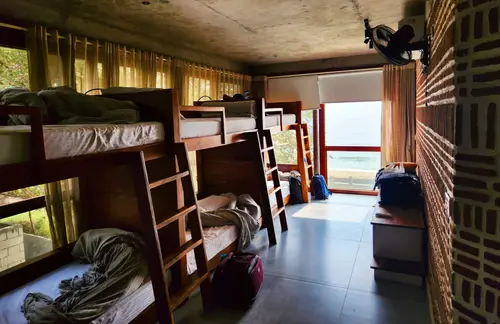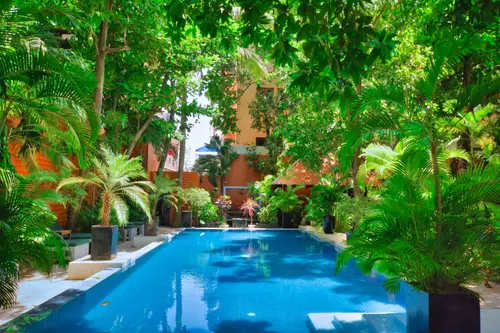What Local Customs Should You Know About in Punta Cana?
Visiting Punta Cana is not only about enjoying the sun and beaches, but also an opportunity to immerse yourself in the local culture and traditions of the Dominican Republic. Understanding local customs will enrich your experience and help you interact with locals in a respectful and friendly way. Below are some key customs and norms to be aware of during your stay in Punta Cana.
1. The Importance of Greetings
In Dominican culture, greetings are very important. If you enter a place or meet someone, it's common and polite to greet them first. Dominicans like to greet with a handshake, especially in formal settings. If you’re familiar with the person, it's typical to greet with a kiss on the cheek (just once) or a hug.
Local custom:
When entering a store, restaurant, or someone’s home, simply say "Hola" or "Buenos días."
Tip:
Use a friendly tone, as Dominicans value warm and cordial interactions.
2. A Smile as a Greeting
In Punta Cana, it’s not uncommon for someone to smile at you when passing by or making eye contact. This doesn’t mean they’re laughing at you but is instead a friendly way of saying hello. Dominicans are very welcoming, and a smile is just a way to show hospitality.
Local custom:
If someone smiles at you, don’t feel uncomfortable—it’s simply a greeting.
Tip:
Return the smile, as it’s considered polite and a good way to engage with the local culture.
3. Punctuality in the Dominican Republic
Punctuality in the Dominican Republic, like in other Caribbean countries, can be a bit more relaxed compared to other cultures. In many social settings, such as meeting with friends or family, it’s not expected to arrive exactly on time. However, if you have formal appointments or tourism-related bookings like tours or restaurant reservations, it’s important to be punctual.
Local custom:
For social gatherings, people may arrive a little later than scheduled.
Tip:
For professional events and reservations, be on time, but don’t worry if others are a little late in informal settings.
4. The Relaxed Pace of Life
Like much of the Dominican Republic, Punta Cana has a relaxed and laid-back atmosphere. Life here moves at a slower pace, which is part of its charm. Dominicans tend to take their time enjoying conversations, meals, and everyday life. Don’t be surprised if things take a bit longer than you’re used to, such as service in restaurants or waiting in stores.
Local custom:
Patience is key. The relaxed pace is part of the Caribbean lifestyle.
Tip:
Embrace the slower pace and enjoy a more stress-free environment.
5. Music and Dance Are Part of Life
In Punta Cana, music is an essential part of daily life. Bachata and merengue are two of the most popular genres, and you’ll hear music almost everywhere—in the streets, in shops, and even on the beach. Dominicans love to dance, and if you get the chance, join a party or simply enjoy the festive energy.
Local custom:
Music and dance are present at many celebrations and events.
Tip:
Don’t hesitate to participate. Dominicans are friendly and enjoy when tourists join the festive atmosphere.
6. Respect for Family and Traditions
Family is the cornerstone of Dominican society and is treated with great respect and care. It’s common to see families gather on weekends or for important events. Children and the elderly are especially valued, and it’s expected to treat them with courtesy and respect.
Local custom:
Respect for family members, especially elders, is very important.
Tip:
If you’re invited to a family gathering, show respect and politeness to everyone, especially the older members of the family.
7. The Use of “Usted” and “Tú”
The Spanish language has different levels of formality. In the Dominican Republic, using “usted” is a sign of respect when speaking to older people or in formal situations. On the other hand, “tú” is more commonly used in conversations with friends or people of the same age.
Local custom:
Use “usted” in formal situations or when you don’t know the person well.
Tip:
If you’re unsure which to use, start with “usted,” and if the person invites you to use “tú,” follow their lead.
8. Tipping: A Common Practice
In Punta Cana, it’s customary to leave a tip. Although some places automatically add a 10% service charge to the bill, it’s common for locals to leave an additional 5-10% as a gesture of appreciation for good service. In bars or with taxi drivers, a small tip is also expected.
Local custom:
Tipping is common, though not mandatory.
Tip:
If the service was excellent, an additional tip will be appreciated.
9. The Meaning of “Con Dios”
A phrase you’ll often hear in the Dominican Republic is “Con Dios” or “Si Dios quiere” (“If God wills it”), reflecting the faith and religiosity of Dominican culture. While it doesn’t necessarily mean the conversation is religious, it’s a way to express good wishes and hope.
Local custom:
Religious expressions like “Con Dios” or “Si Dios quiere” are common in everyday conversations.
Tip:
You don’t need to be religious to use these expressions. They are simply a respectful nod to the local culture.
10. Dress Code: Relaxed but Respectful
While the warm weather in Punta Cana calls for light and comfortable clothing, it’s also important to dress respectfully, especially outside of beach areas. In more formal settings, such as churches or family events, it’s expected to dress more conservatively.
Local custom:
Casual and comfortable clothing is fine, but avoid wearing beachwear in non-beach areas.
Tip:
Pack light clothes for the day, but also bring something more formal if you plan to attend any events or visit a church.
Conclusion
Understanding the local customs in Punta Cana will not only make your experience richer and more authentic, but it will also help you connect with the locals on a deeper level. Warmth, music, and respect for family are fundamental pillars of Dominican culture, and embracing these will allow you to fully enjoy your trip. Immerse yourself in the local way of life and have an unforgettable experience!






















.webp?u=https%3A%2F%2Fimages.ctfassets.net%2Fh9wjlzs95u7s%2F4KEK25Vlh2PuCeNtWq2TLp%2F8bbc0bbc2880954e405d808f470fe018%2FWedding_at_Secrets_Maroma_Beach__1_.jpeg&a=w%3D176%26h%3D264%26fm%3Dwebp%26q%3D75&cd=2025-08-03T16%3A50%3A20.192Z)





.webp?u=https%3A%2F%2Fimages.ctfassets.net%2Fh9wjlzs95u7s%2F7FqynjZVXDw3era9l5PJvV%2Fff9dca157596b34e61f6e8715b6e6815%2Fdescarga__10_.jpeg&a=w%3D184%26h%3D327%26fm%3Dwebp%26q%3D75&cd=2025-08-03T16%3A32%3A34.176Z)








.webp?u=https%3A%2F%2Fimages.ctfassets.net%2Fh9wjlzs95u7s%2F6CllznqFHjW8ugyWRKQzj1%2Ffa4bb689aaec5a8558a4f9d3c13a7c0e%2FWhatsApp_Image_2025-09-11_at_3.34.23_PM__1_.jpeg&a=w%3D400%26h%3D267%26fm%3Dwebp%26q%3D75&cd=2025-09-18T02%3A44%3A03.967Z)
.webp?u=https%3A%2F%2Fimages.ctfassets.net%2Fh9wjlzs95u7s%2F6saOzz8S6MQxS1ECrK2Cse%2Fa0fc36730f2a3a5d7c4224ab5706181f%2Fdescarga__9_.jpeg&a=w%3D184%26h%3D245%26fm%3Dwebp%26q%3D75&cd=2025-08-03T16%3A30%3A15.972Z)


.webp?u=https%3A%2F%2Fimages.ctfassets.net%2Fh9wjlzs95u7s%2F4dW74tv7rtMan4EMjxk1do%2F603e2f67e0efffc534b4ea334eba123a%2Fdescarga__7_.jpeg&a=w%3D184%26h%3D184%26fm%3Dwebp%26q%3D75&cd=2025-08-03T16%3A31%3A54.488Z)
.webp?u=https%3A%2F%2Fimages.ctfassets.net%2Fh9wjlzs95u7s%2F2VmZwgwOAbU0bdf10icmy0%2F38dc18f86f766cce0fb8e54d6d09eadb%2FDreamy_beach_wedding_arch_and_ceremony_details__destination_wedding_at_Huracan_Cafe_in_Punta_Cana__1_.jpeg&a=w%3D184%26h%3D245%26fm%3Dwebp%26q%3D75&cd=2025-08-03T16%3A52%3A22.998Z)



.webp?u=https%3A%2F%2Fimages.ctfassets.net%2Fh9wjlzs95u7s%2F1yBBm0rz9fyXVqAm0CDms7%2F9442c3c495d212df42c24d42cdc0d959%2Fbeach-overview__1_.jpg&a=w%3D175%26h%3D117%26fm%3Dwebp%26q%3D75&cd=2025-01-30T15%3A31%3A57.328Z)
.webp?u=https%3A%2F%2Fimages.ctfassets.net%2Fh9wjlzs95u7s%2F5IfeW08sxVF4X6l4DAuP7s%2F6a9c7dc306840cc227e6c30a74311906%2Fsecrets-royal-beach-punta__1_.jpg&a=w%3D125%26h%3D100%26fm%3Dwebp%26q%3D75&cd=2025-01-29T14%3A25%3A13.691Z)



.webp?u=https%3A%2F%2Fimages.ctfassets.net%2Fh9wjlzs95u7s%2F41x8AaOVJorGb8u3NbKETb%2F3f73e2672d40203f6b7369bcc27a9ecd%2Fimages__28_.jpg&a=w%3D65%26h%3D49%26fm%3Dwebp%26q%3D75&cd=2025-01-28T19%3A50%3A11.614Z)
.webp?u=https%3A%2F%2Fimages.ctfassets.net%2Fh9wjlzs95u7s%2F1vkX3zLDBrE0b3BxDpNECo%2Fa4d2157aec8fb840033ac0612c84f8f9%2Fcaption__2_.jpg&a=w%3D175%26h%3D117%26fm%3Dwebp%26q%3D75&cd=2025-01-28T14%3A28%3A20.303Z)
.webp?u=https%3A%2F%2Fimages.ctfassets.net%2Fh9wjlzs95u7s%2FTW62Z9E0oWNNPYvC10gl0%2F56e85430c26c0b0a5f41e427aa5cad5d%2Fimages__24_.jpg&a=w%3D56%26h%3D56%26fm%3Dwebp%26q%3D75&cd=2025-01-28T14%3A20%3A18.512Z)
.webp?u=https%3A%2F%2Fimages.ctfassets.net%2Fh9wjlzs95u7s%2F2HvqFGqYHWRu8RUxDLPQuA%2F3c28dd21de6b205736e3e618885e9ed6%2Fslide-1__6_.jpg&a=w%3D342%26h%3D192%26fm%3Dwebp%26q%3D75&cd=2025-01-27T20%3A22%3A04.183Z)






.webp?u=https%3A%2F%2Fimages.ctfassets.net%2Fh9wjlzs95u7s%2F7afwmAanW71QKGwQGcl8JS%2F4a3bdba1e12ae75c9527a925ed47256b%2Fslide-82__1_.jpg&a=w%3D342%26h%3D192%26fm%3Dwebp%26q%3D75&cd=2025-01-26T18%3A19%3A31.812Z)


.webp?u=https%3A%2F%2Fimages.ctfassets.net%2Fh9wjlzs95u7s%2F4iTD3OXsxzvnoviHaK7nxW%2F463fa263e69e5fa9dbef95516ff1d560%2Fslide-1__4_.jpg&a=w%3D342%26h%3D192%26fm%3Dwebp%26q%3D75&cd=2025-01-24T13%3A38%3A38.713Z)




.webp?u=https%3A%2F%2Fimages.ctfassets.net%2Fh9wjlzs95u7s%2Fld3gXZTasOJyS0LVdUQGs%2F69c88944d5cef302b9a09a43785b231b%2Fimages__19_.jpg&a=w%3D68%26h%3D47%26fm%3Dwebp%26q%3D75&cd=2025-01-22T00%3A16%3A31.313Z)






.webp?u=https%3A%2F%2Fimages.ctfassets.net%2Fh9wjlzs95u7s%2F1vRAPXkKiswIvFR3HbNybR%2F6dcf257214909b4b367a5fa91d5951b3%2Fimages__15_.jpg&a=w%3D65%26h%3D49%26fm%3Dwebp%26q%3D75&cd=2025-01-21T13%3A47%3A05.407Z)




.webp?u=https%3A%2F%2Fimages.ctfassets.net%2Fh9wjlzs95u7s%2F5dG3cg4J0mPnnmLCl9fzDP%2Fda8b9a61a56414ce137e50c7c5be1875%2Fimages__8_.jpg&a=w%3D69%26h%3D46%26fm%3Dwebp%26q%3D75&cd=2025-01-16T13%3A18%3A29.618Z)


.webp?u=https%3A%2F%2Fimages.ctfassets.net%2Fh9wjlzs95u7s%2F5YIucf3SmTyHcwfC3GXp2T%2F982195febab9bb64b57739d7505d15fc%2Fwaterpark__1_.jpg&a=w%3D131%26h%3D87%26fm%3Dwebp%26q%3D75&cd=2025-01-13T21%3A30%3A52.107Z)
.webp?u=https%3A%2F%2Fimages.ctfassets.net%2Fh9wjlzs95u7s%2F7GR6vzq49bPR9gtkBx9cnq%2F087642b0e210020ecc910556fe09461a%2Fimages__5_.jpg&a=w%3D64%26h%3D49%26fm%3Dwebp%26q%3D75&cd=2025-01-12T15%3A34%3A59.177Z)


.webp?u=https%3A%2F%2Fimages.ctfassets.net%2Fh9wjlzs95u7s%2F7CG40inLNj32IGAhYI6BZZ%2F82c76ffdcbf3e32023bfbfa3d3860298%2Fpools__1_.jpg&a=w%3D175%26h%3D127%26fm%3Dwebp%26q%3D75&cd=2025-01-11T13%3A55%3A31.018Z)




.webp?u=https%3A%2F%2Fimages.ctfassets.net%2Fh9wjlzs95u7s%2F4XByE5DpqVxRIxpxGEhPaM%2F9bfd1ac9c3e1005d7fbbae8d0871fb9f%2FHome-Cabecera-mobile-__1_.jpg&a=w%3D175%26h%3D175%26fm%3Dwebp%26q%3D75&cd=2025-01-05T15%3A09%3A39.912Z)






















